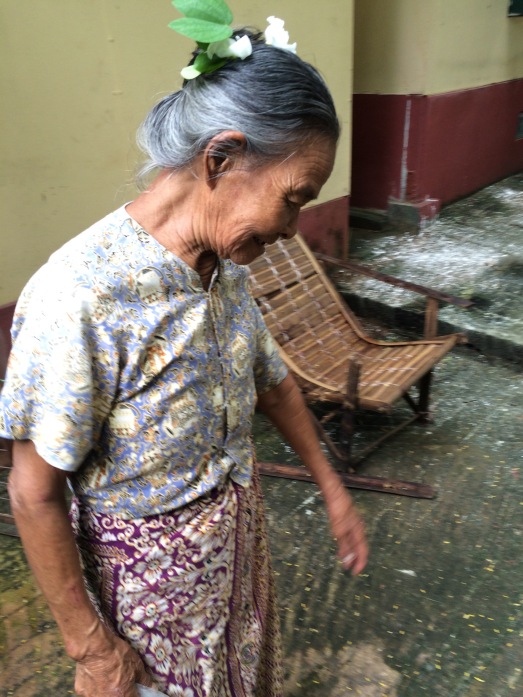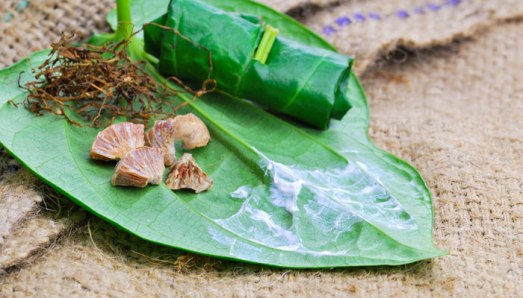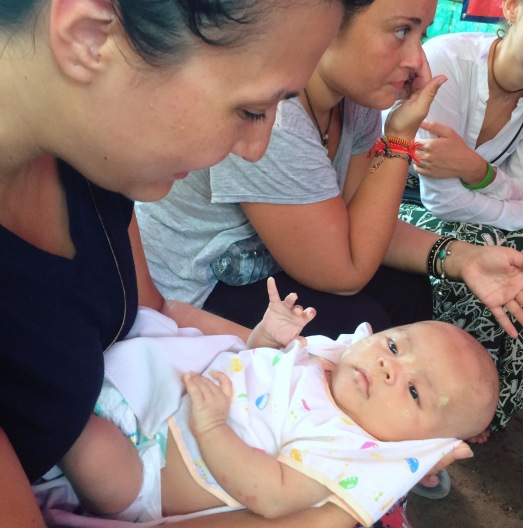I met so many people during my week stay at Thabarwa that impacted me to the very core of my being, and, with their permissions, I thought I would share some of their stories with you. My hope is that by sharing their personal journeys, you too can see the value and specialness of what Thabarwa is doing. We weren’t asked to volunteer at the centre to save anyone, or change things to be more Western, but rather give extra man power to maintain a good Burmese life and to lift people’s spirits. They welcomed us into their fold, and, I think in the end it was my spirit that was lifted by the beauty of their culture.
(By the way, if you haven’t already checked out my Part 1 background post on volunteering at the Thabarwa Meditation and Volunteer Centre in Myanmar, take a few moments to catch up here.)
- The Seamstress
I popped by the local seamstress stand to have a pair of pants fixed that had ripped in the crotch (classy, right? Turns out they really don’t make pants all that sturdy in Thailand, and when you sweat a lot in them the seams tend to rip easily). While I was waiting for my pants to be fixed, I was engaged in a lively, predominantly hand-gesture conversation with the seamstress who spoke broken English at best. She fixed my pants, two pairs, for 700 Kyat (pronounced “chat”). Less than a Canadian dollar got me excellent quality repairs and wonderful conversation. For the following week, every time I walked by she would wave me over and hand me a tea, or a mango, and we would chat for a time while she fixed someone else’s clothing. I sent every foreigner I could in her direction when they needed something fixed.
2. Zen
While I was getting my pants repaired, a fifty-something year old man in sunglasses and slicked back, black hair came and sat next to me and began to unabashedly tell me all about his life. He used to live in Japan and has been to America, but like a slow leak from an air mattress alcoholism steadily deflated his life until his family forced him away to live at Thabarwa. They visited him once a month and sent him some money. He told me they would willingly take him back, but because he still struggles with alcoholism he simply cannot return to them. He had no children, only sisters and parents, and had a tragic tinge of regret in his eye when he spoke their names because he only saw them monthly. Prior to this arrangement, he actually saw them less frequently because for 12 years he was heavily addicted to heroin. He then stopped cold turkey when his mother died and began to see his family more often. Today he works at the centre driving truck to and from Yangon (approximately an hour and a half drive from the centre) and survives by eating the food donated in the alms walk and living for free at the centre. He spends all his earnings on the weekends and in the evenings on alcohol, but says he never misses a 5am meditation. He’s working on it. There was a loneliness about him that I could tell he carried in his heart every day, but despite this, his smile was contagious and he greeted me every day with enthusiasm and bravery. He was trying, and he said he would continue to try until the day he died.
3. My little Burmese Grandmother
On one of my volunteer days at Thabarwa, I found myself sitting amongst a group of 29, fifty-plus year-old ladies who were strongly fawning over me in their shared quarters. I’m not really sure how I ended up sitting on their rock-hard beds, listening one by one as they told me their ages ranging from 53 to 110, but I was pleased to be able to give them something to chatter about, even though the language barrier was strong. They don’t get to leave that room much, if at all. They muttered pleasantly to each other, and to me, about this and that, occasionally asking me, “Where you from?” and, “How old you?” or commenting on how “big” I was.
Since I had no idea what they were saying, my mind wandered to the morning’s events that led me to be sitting on these beds. It was 8:30am, and after having spent some time volunteering at the village orphanage, I had been walking back to the foreigner building in the Thabarwa Centre when an elderly woman with beautiful flowers in her hair stopped me to chat.
She waved her hands furiously about and giggled happily at me, and I tried desperately to match her conversation attempts and sort out what she was saying. Maybe she was talking about how tall I was (she was certainly interested in my strong arms)? Maybe she was talking about her love for avocados (or maybe that’s just me projecting my love for them)? I’m not sure, entirely, but she was beaming with kindness, and the inevitably awkward pauses in conversation that happened because neither of us spoke each others language kept us both in stitches for about 20 minutes.
After a time, she grabbed my hand, linked my arm through mine, and took me on a walk. I didn’t have a choice in the matter, but it didn’t matter because I would’ve gone willingly anyway.
We stopped at a stall where my newly adopted grandma bought mixed meats, and discussed our new friendship with the woman selling the food. (At least, that’s what I think they talked about …) They laughed audibly, especially when she grabbed my arms and showed off my strength and height. Not to be outdone, I grabbed her hands and showed off her tiny stature in comparison, and the women selling mixed meats bashfully but full-heartedly laughed at my attempt at humour. We grabbed our bag-o-meats and moved on down the road.
Next stop: purchasing chewing tobacco and betel.
Betel leaves are used to wrap little green packages that the locals chew throughout the day. This is why everyone’s teeth are red, and why you see so many people spitting on the street. The leaf is placed out, and an areca nut, mineral slaked lime (calcium hydroxide), lime, and tobacco are added. Depending on the region, I was told sometimes they add spices. Then they wrap them up, put them in a little plastic bag, and sell them to locals. I got to watch my grandma purchase her daily stock and socialize with the betel vendor; it doesn’t get much more authentic than that, now does it?
We subsequently made our way down to the road, waving to passersby and socializing as we went until I ended up sitting amongst women who have probably seen and experienced more than I could ever imagine, but rarely got to chat to a foreigner. I felt humbled to be there, confused about what the heck we were talking about most of the time, and happy to be laughing with a group of women who so willingly welcomed me into their home to share their company.
4. Sayalashabe and Pinasara
Sayalashabe is a 36 year old Buddhist nun who, as I mentioned in my previous post, is the only one who cooks for the foreigners. She spends her mornings at the local orphanage, and the rest of the day in the kitchen cooking the foreigner dinner. She lives in a small house near the orphanage, where I tutored her in English some evenings. She was a hard worker and a kind soul. Her apprentice, Pinasara, wears light pink to denote her student-status and works closely with her. The first day I met them both, I was walking past the local orphanage when they waved frantically at me, Ella, and Erin to come in through the gate. They introduced us to all the orphans – including a one-month old that I almost adopted and took home – and chatted with us while we played with the kids.
After our first meeting, I saw them on the daily. I learned later that Pinasara was a 22 year old student who was always making jokes with her fellow students and her teacher. Her happiness was contagious, and being with her made you want to stay with her forever. She helped her teacher, Sayalashabe, with the cooking every day and volunteered at the orphanage. I have never met happier more smiley person in my life. It was always a pleasure to talk to her and help her practice her English, and I hope to go back someday to visit her again.
5. Ma-Sue the Tailor
She found us on the street and offered to make us custom clothing. Stay tuned for a more detailed description of our adventures with her – she quickly became our Burmese “sister” that we fell in love with!
6. The Longyi Volunteers
A longyi is a traditional wrapping skirt worn by both men and women in Burma, and, if you don’t know how to put them on properly, they fall down … all the time. Now it’s really not appropriate to have your longyi fall down in the middle of the street, especially in front of Buddhist nuns and monks (don’t worry, this still happened and everyone laughed so hard at me in the street while I scrambled to be ladylike). So, on a regular basis I could be found holding my skirt with one hand and doing a task with the other. Every single time I did this, whether I was at the market or just outside of the foreigner building, a Burmese woman would see me struggling and come running over to help me put on my skirt. This happened at least 20 times with different women, who didn’t even think twice about helping me.
Ella captured this perfectly the first time it happened to me. While we were out and about, a tiny little student nun came running behind me, wrapped her arms tightly around my waist and went to work tying my longyi. After laughing non-stop, I tried to watch her do it again so I could learn the magical ways of longyi tying, but to be honest I never really mastered it. When they did it, the skirt stayed put for hours. When I did it … the skirt stayed put for a maximum of 92 seconds. I’ll stick to midwifery, I guess.

6. Fellow Thabarwa Foreigners
I met so many open-minded, kind foreigners at Thabarwa from all over the world. Germans, Israelis, Americans, Brits, Argentinians, Chileans, French, and American travellers who felt drawn to this place. I never felt more supported to be a good person, to give, and to be myself than I did at this centre, and while I’m sure the meditation and volunteering had a lot to do with it, I think the spirits that live within the volunteers also boosted me up. I’ll never forget these instant friendships, and I can’t wait to meet each of these volunteers again someday. My thanks to all of them, the Thabarwa Centre, and the locals for waking up my soul to what really matters in life – love, kindness, and friendship. I’m indebted.








